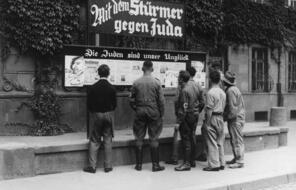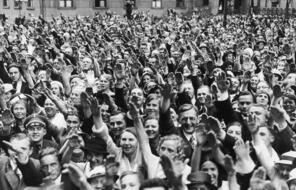The Impact of Propaganda
At a Glance
Subject
- History
- The Holocaust
- Propaganda
1. The museum exhibit Der ewige Jude (The Eternal Jew), represented by the poster you analyzed, also included a film. Filled with blatant antisemitic lies, the film was presented as a documentary but was in fact propaganda. Marion Pritchard, then a graduate student in the Netherlands, recalled seeing the film:
We went to see this movie and sat and made smart remarks all the way through and laughed at it because it was so outrageous. And yet when we came out of the movie, one of my Gentile [non-Jewish] friends said to me, “I wish I hadn’t seen it. I know that it was all ridiculous and propaganda, but for the first time in my life I have a sense of them and us—Jews and Gentiles. I’m going to do everything I can to help them, but I wish I didn’t have this feeling.”
1
What did Marion Pritchard’s friend mean when she said, “I know that it was all ridiculous propaganda, but for the first time in my life I have a sense of them and us—Jews and Gentiles”? How do you explain her statement? What does her statement suggest about the way that propaganda can affect people?
2. Some scholars caution that there are limits to the power of propaganda; they think it succeeds not because it persuades the public to believe an entirely new set of ideas but because it validates beliefs people already hold. Scholar Daniel Goldhagen writes:
No man, [no] Hitler, no matter how powerful he is, can move people against their hopes and desires. Hitler, as powerful a figure as he was, as charismatic as he was, could never have accomplished this [the Holocaust] had there not been tens of thousands, indeed hundreds of thousands of ordinary Germans who were willing to help him. 2
Do you agree or disagree with Goldhagen’s ideas about the power of propaganda? Would people have rejected Nazi propaganda if they did not already share, to some extent, the beliefs it communicated? How do Goldhagen’s ideas help you understand Marion Pritchard’s friend’s reaction to the exhibit’s film in a new, different, or deeper way?
- 1Carol Rittner and Sondra Myers, eds., The Courage to Care (New York: New York University Press, 1986), 28. Reproduced by permission from New York University Press.
- 2Daniel Jonah Goldhagen, interview with Richard Heffner, “Hitler’s Willing Executioners, Part I,” The Open Mind (TV program), PBS, July 9, 1996.
Get the Handout
How to Cite This Handout
Facing History & Ourselves, "The Impact of Propaganda," last updated March 12, 2018.
This reading contains text not authored by Facing History & Ourselves. See footnotes for source information.













